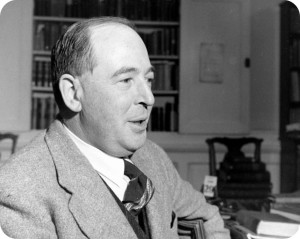For the past five Saturdays I’ve shared results of my survey with the Wade Center on how C. S. Lewis’s life and writings have influenced Americans of our current generation. The earlier questions were quite specific, but at the end of the survey, I gave an opportunity for the respondents to add anything else they thought worthy of sharing. Here are some of those reflections.
 A number of respondents credit Lewis with halting their slide into unbelief while in college. “Lewis sustained me through years of doubting my faith in college,” wrote one. “I’m not exaggerating to say that Lewis re-evangelized me when I might have otherwise abandoned my childhood faith.” “Lewis, along with Francis Schaeffer,” opined another, “helped me to remain orthodox while most of my college friends have fallen by the wayside.”
A number of respondents credit Lewis with halting their slide into unbelief while in college. “Lewis sustained me through years of doubting my faith in college,” wrote one. “I’m not exaggerating to say that Lewis re-evangelized me when I might have otherwise abandoned my childhood faith.” “Lewis, along with Francis Schaeffer,” opined another, “helped me to remain orthodox while most of my college friends have fallen by the wayside.”
Still another remembered,
When I was an arrogant college student who believed only weak and/or stupid people believed in Christ, Lewis showed me beyond question that faith could make sense even to an intellectual. He awakened my spiritual imagination with his fiction and persuaded my reason with his nonfiction. He also gave me a grounding in traditional Christianity that facilitated my later conversion to Orthodoxy.
 A respondent who is currently working through a doctoral degree had this to say about how Lewis provides help:
A respondent who is currently working through a doctoral degree had this to say about how Lewis provides help:
“Lewis is frequently on the tip of my tongue–his characters remain alive in my heart as friends and relatives–his lessons often spring to mind. As a doctoral student in theology, I often find connections to Puddleglum or Eustace at the heart of theological arguments.”
And those who have moved on into their careers, such as this respondent, can also point to Lewis as an inspiration: “I have always appreciated Lewis’s clear, precise, and elegant writing style. As an academic researcher, I have tried to emulate his style in my professional writing.”
Another provided a more in-depth scrutiny of how Lewis dealt with the intellect:
Lewis’s works exemplify what I consider a Holy Spirit baptized intellect. Knowledge on holy fire. His ability to frame the issues in a succinct way and then address them with such extremely critical thinking skills provides a wonderful exemplar for Christians all over the world on how to not only be people of faith, but also engage our intellect (verbal and writing skills) to provide a “defense for the hope that is within us.”
His work, Mere Christianity, remains one of my favorite recommendations for intellectual unbelievers who are serious about weighing through claims of Christian faith. I believe many will either embrace Christ for the first time or reinforce their beliefs in Him through its reading.
“Since my study of C.S. Lewis, I have not been able to talk about anything else,” enthused one respondent. “It is as though I am on fire after having been asleep.”
I have more excellent testimonies to share; I’ll save the rest for next Saturday.
